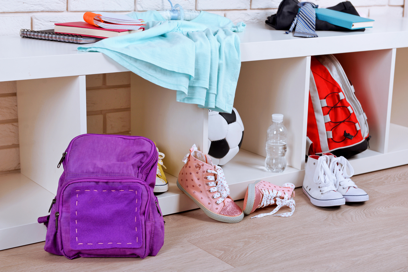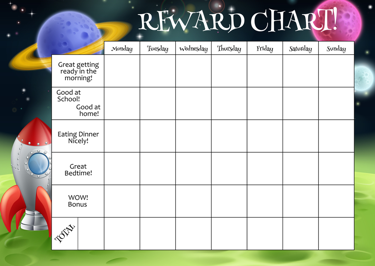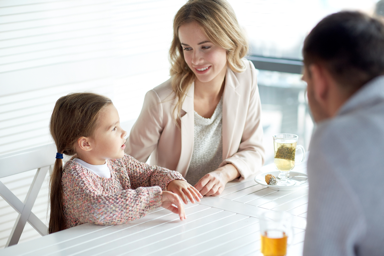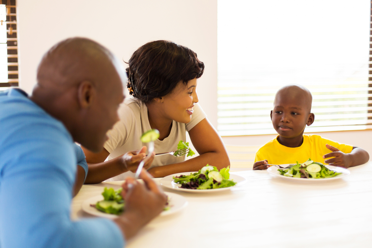How to Create the Best Possible First Day Back to School for Your Child…and You!
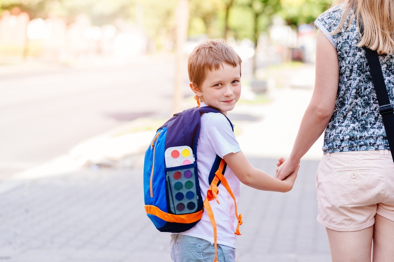
Parents, before you start doing your celebration dance with the kids going back to school, make sure you have your ducks in order, physically, mentally, and emotionally, so both you and the kids are prepared before the first big day.
And I know many of you may have already gone back to school, but it’s never too late to have these conversations with your kids or to get your house in order (again) to support the rigorous schedules the school year brings.
So here are a few tips to help you have the best opportunity of providing you and your child the best possible first day back to school that you can be proud of.
Get to sleep
Sleep is a hot topic right now in a lot of households. Teenagers can’t seem to get enough of it and the little kids resist it. Either way, it’s time to get back on that schedule again. The transition from summer laziness to getting up early and getting a move on can be sooo hard. And if your kids were not on a schedule, now would be a good time to introduce the concept.
You can start by having a discussion with your kids about how much time it usually takes them to get out the door on any given day. You can laugh and have fun together in this conversation.
Then review all the things that need to happen before they walk out the door. (HINT: Create a list and put it on the fridge to reduce the number of times you have to ask, “Did you brush your teeth?” “Did you put on underwear today?” “Did you take your vitamins?” “Did you put your homework/my signature form in your backpack?” Then you can calmly respond with, “Review the list please!” Add pictures on the list for non-readers.) Parents tell me that this is one of the most appreciated and effective tips I offer.
Get them involved in the conversation and work backward on a timeline from there. Let them help determine when to wake up. Empower them to take responsibility for themselves. You may even want to consider buying an alarm clock that they set each night (and add that to the “After School Checklist”).

If you’re wondering about some sleep guidelines for your child, here is some helpful data. The National Sleep Foundation recommends preschoolers (ages 3-5) get 10-13 hours of sleep. School-aged children (ages 6-13), they should get 9-11 hours of sleep, but no one size fits all, so depending on your child they encourage not less than 7 hours and not more than 12 hours. For teenagers, they recommend not less than 7 hours and not more than 11. So, plan accordingly for their best health.
Get organized
Author and ultimate organizer Christina Scalise says, “Organization isn’t about perfection it’s about efficiency, reducing stress and clutter, saving time and money, and improving your overall quality of life.” Especially when it comes to back-to-school, reducing stress and increasing ease sounds like the right combination for many families.
As mentioned above, it may save your sanity to create a list and paste it on the refrigerator for your expectations of your kids to do before school and after. It teaches them to take care of themselves, and builds trust, self-confidence, and self-discipline.
Here is an example of a list to use, but do what suits you and your family. Ask yourself, “What do I always find myself repeating?” and add that to the list.
Before you leave for school, ask yourself, “Have I…”
- eaten breakfast?
- taken a shower?
- flushed the toilet?
- moved my clothes from the bathroom floor to the dirty clothes hamper?
- hung up my towel?
- brushed my teeth?
- rinsed out the sink?
- taken my vitamins?
- made sure EVERYTHING is in my backpack (including lunch, homework, snack, water, signature form, and a jacket)?
- fed the dog?
- asked Mom or Dad if she/he needs help with anything?
After your rest and snack and before screen time, ask yourself, “Have I…”
- cleaned up after myself in the kitchen?
- unloaded or loaded the dishes?
- got out my lunchbox, emptied it, and put it on the counter?
- placed my backpack on the hooks (up off the floor)?
- put my shoes in my room or by the bench cubbyholes?
- put my dirty clothes (and socks!) in the dirty clothes hamper?
- done my homework?
- given Mom or Dad any signature forms to sign?
- read 20 minutes?
- picked up the living room/entryway?
- fed or watered the dog?
- told Mom and Dad I love them and that they’re doing a good job?
Like that last one? I thought any parent would. Why not give yourself a little boost of happiness and love from your kid? Sometimes you’ll get it unexpectedly! You’ll be glad you included it. As always, encouraging gratitude in your children makes for a much happier child, not to mention Dad and Mom.
Make sure you discuss with your child the appropriate time for after-school rest, snacks, play, and homework, especially if they are involved in after-school activities or sports. It’s never too early (or late!) to teach the importance of time management.
You may also want to add a separate chart for chores or ways they can earn their allowance or whatever reward system you use for your home. That way your expectations are clear, and they know what they are responsible for.
Create a system at home so that everything school-related (shoes, backpacks, signature forms, lunch boxes, etc.) has a place and everyone knows where their school items go (and can be found!) This cuts down on, “Mom!!! Where’s my…{insert random school thing here}!!!” as you’re trying to get out the door. Remain calm and reinforce, “A place for everything and everything in its place!” (Thank you, Benjamin Franklin, for that quote!).
For school-aged kids, it is also good to have a family calendar on the wall. That way they can see the important school and family events, sports practices and games, holidays, vacation dates, etc. Get them involved and review the calendar each week and month as a great way to have a conversation about what they are looking forward to, concerns they may have, etc. For teenagers, consider creating a family online calendar that everyone can contribute to. These are great ways to build trust and self-reliance.
Tip: If you want to increase the chances of getting good results, definitely introduce a rewards system for your child!
Talk about it
Going back to school can create a lot of anxiety, especially if your kid is starting at a new school. Everything from “Will I like my teacher?” to “Will I make a new friend?” can make your youngster nervous.
Be sure to ask questions and get your child to talk about their feelings going into the first day. Acknowledge their feelings are valid and real. Listen to their concerns. Then create a plan or problem-solve together possible scenarios of how to best handle the situation. Don’t forget to remind them of their friends that will be there or how to make new friends (see below). It’s always good to have a buddy on a day (or week) of firsts!
Discuss what they can expect will happen during the first day (or week). Walk through what your first days of school were like. Do you have a particular memory that was good or funny?
Did anything scare you about going to school? Did something troublesome happen to you? How did you handle it? The point I want to stress here is to acknowledge their feelings and get into a conversation about it.
Emotional and physical safety
Are their concerns about bullying? This is an important topic right now that most schools, administrators, principals, and teachers are prepared for. Let your child know that they should talk to an adult if they are bullied or see someone else bullied at school.
If you want to read more on this topic, I’ve written a few articles that you may find helpful:
- Boys Bullying and Teasing Girls: It’s Not Always Physical
- Bullying on Social Media: Tips to Lessen or Even Eliminate the Impact
- Mean Girls: Who They Are, Why They Are So Mean, and How To Deal With Them
For your middle schooler and high schooler, I strongly suggest you read this below and see if this increasingly popular plan is right for you and your family.
Practice social skills
Especially, if you’re the new kid or if your kid has been at your school since preschool, encourage social skills. We all need more kindness in this world (now more than ever), so if you’ve been at this school for a while, offer a challenge to your kid on the first (or first few days) of school. Meet someone new! Here are a few things to do that promote being friendly and practicing good social skills.
- Say hello!
- Smile
- Make eye contact
- Have prepared questions including, “Are you new here?” “What’s your first impression of your teacher?” “Do you have any friends in your class?” “What are you most looking forward to this year?”
Practice before the first day together and after school (hopefully at dinner) talking about how that felt to put yourself out there. Discuss the results. Encourage courage and kindness.
For your child, it’s a good way to break the ice on the first day and potentially make a new friend. Sharing kindness or starting a conversation is a great life skill that we all can be better at.
Whether your kid expresses their nervousness or plays it cool, talking about the first day and setting your family up for success will lead you to the best first day you’ve ever had. Life is full of first days and new adventures. Model relaxed, cheerfulness (even if you’re nervous for them), and trust that your child is resilient and will do just fine!
I hope you found this article helpful as you prepare yourself and your children to go to school. As the father of three, I remember these days including the challenges and the wonderful opportunities that present themselves for you and your children. I invite you to contact me if I can be of any assistance.


